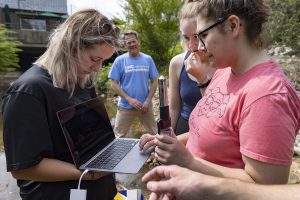Sustainability Courses at Carolina
Sustainable Carolina released a searchable, comprehensive list of sustainability-related courses at UNC-Chapel Hill. The list is a resource for students who want to learn more about the interconnectedness of society, ecology, and economics. Students can search the list using key words, department names, and general education requirements (Making Connections Gen Ed curriculum or the new IDEAs in Action curriculum).
In addition to individual sustainability-related courses, Carolina students can pursue minors, majors, and dual-degree programs related to sustainability.
 Sustainability Studies Minor
Sustainability Studies Minor
Students who aren’t pursuing a major in environmental sciences or environmental studies can pursue a minor in sustainability studies. Minoring in sustainability can be beneficial to students in majors across schools and departments. As we confront the challenges associated with extreme weather patterns, climate change, and environmental justice, taking sustainability courses at UNC-Chapel Hill can strengthen career pathways.
Students can complete most of coursework for the minor at UNC Institute for the Environment’s Sustainable Triangle Field Site (STFS). STFS offers students an opportunity to pair academic studies in the environment with urban planning, design, and other related fields.
For more information on STFS, contact co-directors Mike Piehler or Toni Sebastian.
Urban Studies Minor
The minor in planning and urban studies allows students to explore urban and regional challenges through a planning lens. By learning about regional and urban planning, students can better understand what makes for green, livable cities in the wake of climate change. To earn this minor, students must take two required courses and 9 elective credits.
For more information on the undergraduate minor contact Sandra Lazo de la Vega.
Courses of Interest
Students interested in completing the sustainability or urban studies minor might look into PLAN/ENEC/ENVR cross-listed courses such as ENVR/PLAN/ENEC 635: Energy Modeling for Environment and Public Health and PLAN/ENEC/ENVR 548: Sustainable Energy Systems. Both of these courses are taught by Noah Kittner, who is based in the Gillings School of Global Public Health.
Carolina Geography
Geography brings together physical science, social science, and the humanities to study Earth’s patterns and processes. Because there are a variety of sub-fields within geography, the department of geography put together a “pathways” document to help students pursue particularly areas. Options for pathways that also pertain to sustainability include climatology, environmental systems, diversity and justice, GIS, and urban development/planning.
Contact the Director of Undergraduate Studies in Geography for more information on courses, requirements, and planning your geography major.
Ackerman Center for Excellence in Sustainability
The Ackerman Center for Excellence in Sustainability (ACES), formerly the Center for Sustainable Enterprise, drives responsible thought leadership and inspired action to accelerate progress in social and environmental sustainability through innovative and profitable business solutions. Undergraduate students in the Kenan-Flagler Business School can take sustainable enterprise electives while earning their degree. Other opportunities for students include the Sustainable Business Club, attendance to competitions and speaker events, and leadership opportunities within ACES.
Contact Executive Director Jeff Mittelstadt for more information.
Dual Degree Programs
The Environment, Ecology and Energy Program at Carolina collaborates with three professional schools on dual bachelor’s and master’s degrees. Students in these programs take graduate level courses during their fourth year of undergraduate studies.
- Environmental Informatics Dual BS-MSIS Program: Offered through the School of Information and Library Sciences (SILS), students learn how to manage environmental data for a variety of applications.
- Environment and Science Communication Dual Degree: Offered through the Hussman School of Journalism and Media, students learn how to write about science and disseminate messages related to improving our environment.
- Environmental Science and Public Administration Dual Degree: Offered through the School of Government, students learn the relationship of environmental science to society and prepare students for careers in public administration.
